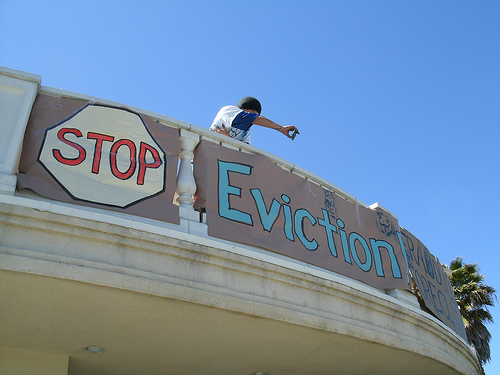July 7, 2016
This blog post discusses the role of the Summons for Unlawful Detainer in Virginia foreclosures. “Unlawful Detainer” is a legal term for the grounds for eviction from real estate. The foreclosure trustee and new buyer go to a real estate closing a few days after the foreclosure sale. Upon settlement, the title company records the Trustee’s Deed of Foreclosure in the local land records. In most land transfers, the giver and recipient of the ownership of the real estate participate voluntarily. In a foreclosure, the borrower may contest the validity of the foreclosure transaction and the Trustee’s Deed. The Trustee’s Deed is necessary to the new buyer to pursue eviction proceedings against the occupants of the property. The Trustee’s Deed is the buyer’s legal basis for filing the Summons for Unlawful Detainer form. A copy of what this form looks like is available on the website for the Virginia court system.
Post-foreclosure evictions are not the only reason anyone files a Summons for Unlawful Detainer. Unlawful Detainer suits get into court in different situations. The most common is where a tenant fails to pay rent or defaults on the lease. However, it can be used for a variety of situations where an occupant entered onto the property with lawful authorization (such as a deed or lease) but has continued to occupy the premises after his right to do so ended. Every landlord knows that each month that the tenant holds over without paying is rental income that will likely never be collected. The General Assembly enacted legislation to streamline property owner’s rights to evict tenants and other persons unlawfully detaining possession of the real estate. This prevents an unfair result that might occur if a tenant could use lengthy court proceedings to live in the premises rent free when he may not have money to pay a judgment at the end. The buyer of the foreclosure property has made a financial commitment to own the property. Foreclosure investors want to evict the borrower, make any necessary repairs as soon as possible so that the property can be rented out or re-sold. So the summons for unlawful detainer form is a powerful, attractive tool for the new buyer in a foreclosure.
The investor or their attorney typically files the Summons for Unlawful Detainer in the local Virginia General District Court (“GDC”) after receiving the Trustee’s Deed. The GDC is the local court in Virginia most people are familiar with. This is where Virginians go for traffic ticket cases and suits for money under $25,000.00. The GDC has a “Small Claims Division” where parties litigate without lawyers. The Sheriff’s Office serves the Summons for Unlawful Detainer on the borrower and any other occupants. Upon receipt of the Summons for Unlawful Detainer, the borrower faces a “fight or flight” decision. Experienced lenders, trustees and purchasers know that the Trustee’s Deed of Foreclosure can be used as a weapon to try to crush the borrower’s opposition to the foreclosure. The Bank, trustee, and new buyer are can pursue these legal matters without the threat of having being evicted out of their base of operations. The borrower would not be in a foreclosure matter if there wasn’t a difficulty making payments. Once the Deed is in land records and the Summons is filed with the GDC, the borrower also has to mount a legal defense to keep possession of the home. A borrower is well advised to seek qualified legal counsel in his jurisdiction to help deal with these matters.
The Summons for Unlawful Detainer Summons must contain the name, address and point of contact for the new owner seeking to evict him. This will tell the borrower whether the property is now owned by the bank that requested the foreclosure or an unrelated investor. The Summons sets out when and where the borrower or his attorney must appear to contest the eviction proceeding. Every form states, “If you fail to appear and a default judgment is entered against you, a writ of possession may be issued immediately for possession of the premises.” A writ of possession is a document signed by the judge that authorizes the Sheriff’s Office to go out to the house and remove the people and belongings found there and turn it over to the new buyer and their locksmith.
What can a borrower do who has been wrongfully foreclosed upon and received a Summons for Unlawful Detainer? The earlier the borrower engages with legal counsel, the more there is that the attorney can do to help. On June 16, 2016, the Supreme Court of Virginia initiated legal reforms which dramatically shift the balance of power in these post-foreclosure evictions. If properly defended, the borrower may have an opportunity to get the dispute over the validity of the foreclosure decided before ordering eviction. This is good news. Prior legal precedent required many borrowers to defend against a Summons for Unlawful Detainer at the same time he pursued his own wrongful foreclosure claims against the bank and trustee. I discussed this new case in greater detail in my blog post, “The Day the Universe Changed” and in a radio show interview available in the “On the Commons” podcast library. While borrowers will continue to receive these “Summons for Unlawful Detainer” forms, they now have better options.
Unless the borrower does not intend to contest the eviction and foreclosure, borrowers receiving a Summons for Unlawful Retainer from the buyer of the foreclosure property should immediately seek qualified legal counsel in order to explore available options. The Virginia General Assembly is anticipated to enact new legislation in its next session to clarify the jurisdiction of the GDC and the appropriate court procedures when a borrower contests the validity of a foreclosure related to the eviction proceeding. With assistance, borrowers may be able to take advantage of these legal reforms.
photo credit: GEDC1290 s via photopin (license)


